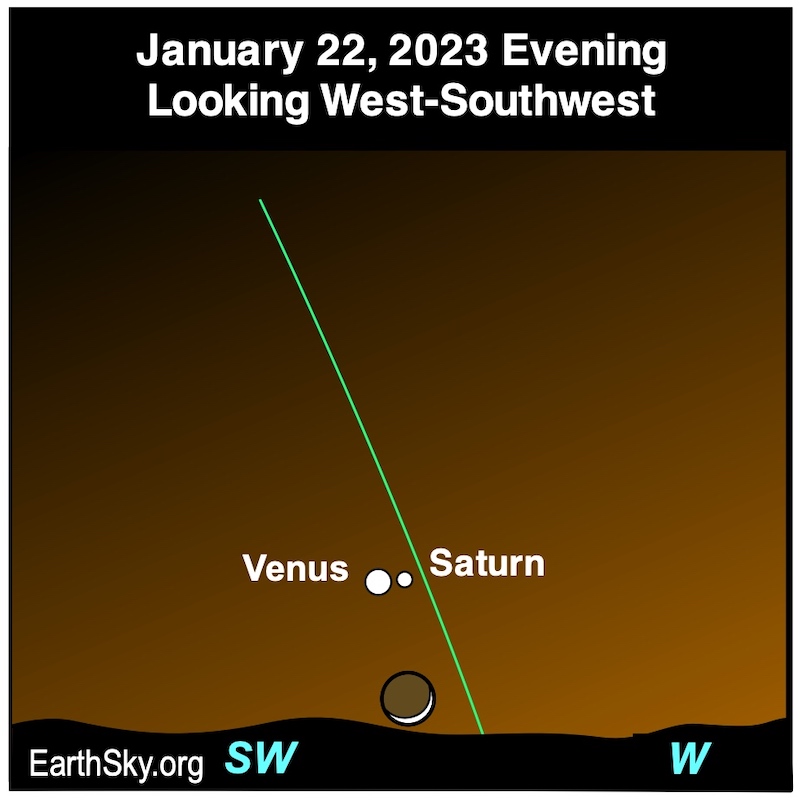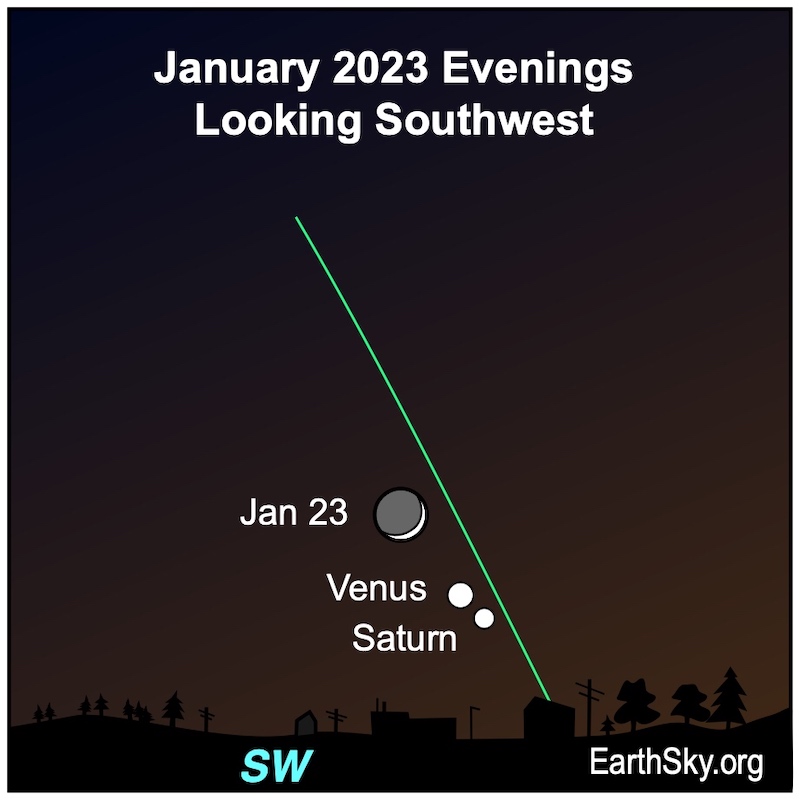
Venus and Saturn conjunction
On January 22, 2023, catch the dazzling planet Venus and much fainter planet Saturn near each other after sunset. Start looking near where the sun just set as twilight falls. As a bonus, you may spot the young waxing crescent moon closer to the horizon. The sliver of a crescent moon will set about 30 minutes before the planets. Then, the planets will disappear over the horizon roughly 90 minutes after sunset.
At their closest, Venus will pass 0.4 degrees (almost the width of a full moon) from Saturn on the sky’s dome.
You should have no problem spotting Saturn near Venus with the eye alone. Both are bright planets! But Venus is much, much brighter. Do you have binoculars or a telescope? These two worlds are so close together from our perspective that they’ll fit inside a single field of view.
Saturn is shining at +0.7 magnitude. Meanwhile, Venus shines at -3.9 magnitude. In fact, Venus ranks as the 3rd-brightest celestial body in the sky, after the sun and moon. Venus is so dazzlingly bright that some sharp-sighted people can even see spot it in daylight.
Moon near Venus and Saturn on January 23
While Venus and Saturn may be a bit farther away from each other on the dome of our sky on January 23, the moon has moved closer to the planetary party. The two planets are now over a degree apart, and with the thin waxing crescent moon so close, they make a lovely trio in the early evening sky.
The view changes with time depending on your location on the globe. Some of you – for example, those in the Philippines – get to see Venus and Saturn less than a half degree apart on January 23 when they’re closest to the moon. For a more precise star chart from your location, try Stellarium online.

Submit your photos of Venus, Saturn and the moon to EarthSky Community Photos.
Bottom line: Catch the Venus and Saturn conjunction after sunset on January 22, 2023. They should be easy to see when dusk turns to darkness. The next evening, the moon joins them, making a lovely sight.
The post Venus and Saturn conjunction January 22 first appeared on EarthSky.
from EarthSky https://ift.tt/UJvAepk

Venus and Saturn conjunction
On January 22, 2023, catch the dazzling planet Venus and much fainter planet Saturn near each other after sunset. Start looking near where the sun just set as twilight falls. As a bonus, you may spot the young waxing crescent moon closer to the horizon. The sliver of a crescent moon will set about 30 minutes before the planets. Then, the planets will disappear over the horizon roughly 90 minutes after sunset.
At their closest, Venus will pass 0.4 degrees (almost the width of a full moon) from Saturn on the sky’s dome.
You should have no problem spotting Saturn near Venus with the eye alone. Both are bright planets! But Venus is much, much brighter. Do you have binoculars or a telescope? These two worlds are so close together from our perspective that they’ll fit inside a single field of view.
Saturn is shining at +0.7 magnitude. Meanwhile, Venus shines at -3.9 magnitude. In fact, Venus ranks as the 3rd-brightest celestial body in the sky, after the sun and moon. Venus is so dazzlingly bright that some sharp-sighted people can even see spot it in daylight.
Moon near Venus and Saturn on January 23
While Venus and Saturn may be a bit farther away from each other on the dome of our sky on January 23, the moon has moved closer to the planetary party. The two planets are now over a degree apart, and with the thin waxing crescent moon so close, they make a lovely trio in the early evening sky.
The view changes with time depending on your location on the globe. Some of you – for example, those in the Philippines – get to see Venus and Saturn less than a half degree apart on January 23 when they’re closest to the moon. For a more precise star chart from your location, try Stellarium online.

Submit your photos of Venus, Saturn and the moon to EarthSky Community Photos.
Bottom line: Catch the Venus and Saturn conjunction after sunset on January 22, 2023. They should be easy to see when dusk turns to darkness. The next evening, the moon joins them, making a lovely sight.
The post Venus and Saturn conjunction January 22 first appeared on EarthSky.
from EarthSky https://ift.tt/UJvAepk

Aucun commentaire:
Enregistrer un commentaire